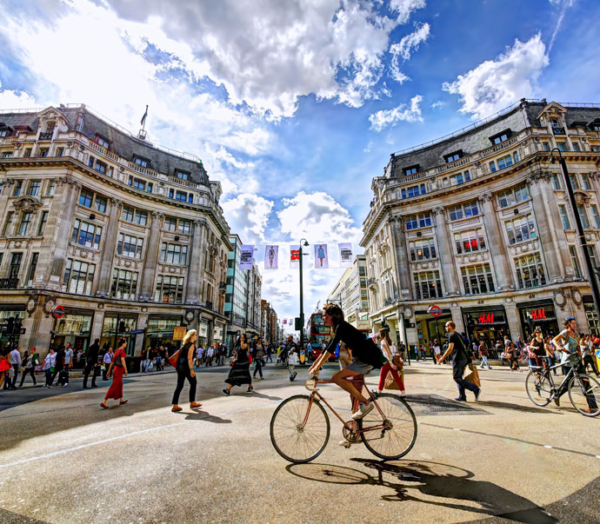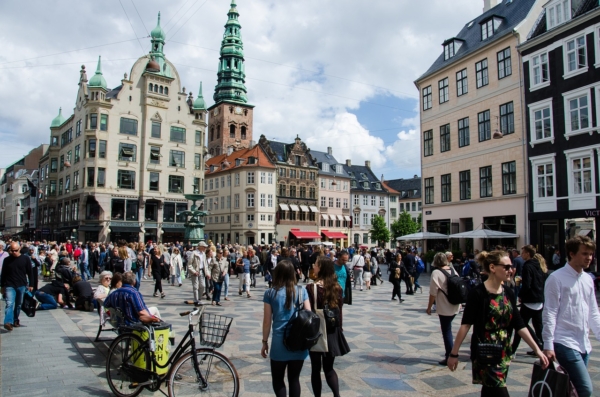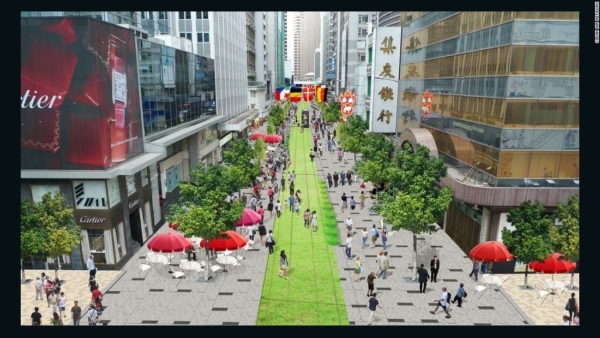Car Free Futures


Buses have been my motor transport. Our mass transit system may have ebbed and flowed with deregulation, but it has always been excellent. In all the areas I’ve lived, I’ve never been more than ten minutes walk from a bus stop. With nearly all buses running a minimum of every twenty minutes, it’s hard to ask for more.
Mostly, though, my transport has been my feet. I’ve walked the city for years, accompanied by a geological strata of personal audio devices. From wide Georgian boulevards to closes and wynds, I’ve walked every street in the city centre and countless more beyond.
I know this city, especially the area around Leith Walk. I know the pavements that are best avoided in the rain, when the oil in the paving stones makes them slippery. I know the light sequences that drag and when it’s better to cross between traffic. I know the wee streets and I know the short cuts.
Things changed in October last year. I was forced out of Leith by a landlord looking to sell and the pustulant spread of venereal short term lets. I ended up, miraculously, across the street from the Firth of Forth. Across a street that’s a major artery, two-lanes narrow.
I can see a wee bit of the Forth from my window, in between cars and buses and cars and vans and cars and lorries and cars, speeding and blasting and rushing and booming by. There’s a beach over there. Just a wee one but a lovely one. Sand and mud and rocks and seaweed and waves. A beach! A joy. But when I want to go to the beach, I have to cross that street. That endlessly busy street. The amount of traffic is shocking. Even now, as I write around 11pm, I can hear cars passing, one a minute and more. During the day, they are almost constant.


True, it’s not much of a realisation. But think about it for a minute. Really think about it. When you are a single human, moving about in a settlement created for and by a mass of humans, your needs are below that of a car. You are at best of secondary importance. If you need to cross the street – and you will – you have to wait. You have to take a chance, take your life in your hands on occasion, or sometimes walk a long way to find a crossing. Cars do not wait. Cars are primary. You. Will. Wait. For. Cars.
It’s just staggeringly wrong. Most car journeys surely aren’t necessary. Am I really that unusual in my lack of need for them?
After living across a crushing current of cars from a beautiful beach for six months, I have finally, finally grown to loathe them. I loathe their noise, their pollution, their drivers’ inability to comprehend 20mph and their endless ubiquity.
I want rid of them. I want to see our streets free of cars. Gone. Silent. No more waiting for a gap in the traffic or shouting to be heard. No more deaths from pollution. Empty streets, just like in photos of old. Streets where humans are paramount.
We need to simply ban cars. No more dicking about with 20mph zones and traffic calming measures. No more kowtowing to corporate pressure vehicular access to slake an unquenchable desire for the impossibility of ever growing profit. Just fucking ban them. Ban cars. Ban them. Corporations can get tae. Drivers never pay attention to calming and speed restrictions anyway, not when it might add a few minutes to their precious journey. So fuck the lot of them and just ban fucking cars.


Imagine living like that. Imagine living in a city where humans are the most important elements on the street. Imagine hearing the world, not just the choking swirl roar of internal combustion engines, rapid fire exploding their poison-laced fuel, making use of just fifteen percent of its energy for motion and scaring the living shit out of you, should you for one second stop paying attention to them. Silence. Fresh air. Space.
Or imagine walking down Princes Street and watching traffic wait for five minutes or longer while people walk over crossings, just to get a minute to drive through. Can you imagine that role reversal?
I imagine these things a lot now, as I walk the streets. I stare cars down, as I cross. I walk boldly with less of a rush, because those bastards should be the ones changing their speed, not me, not the human. I’m sick of being their subordinate.
In the coming months, we may be getting a few temporarily car-free streets in Edinburgh. I look forward to them, but until North Bridge is as empty as it was during Tuesday’s Extinction Rebellion demonstrations, I’ll keep breathing the filth and won’t hold my breath, because the cars will never slow and they will certainly never stop. The noise and the congestion and the pollution will never be replaced by silence, space and clean air.
We might care and you might have joined me angrily imagining a different way of life, but we live in a system that will not permit challenges to the pursuit of profit. Cars are a cog in the consumption machine and society cannot tolerate their termination. Drive and consume, happy punter, drive and consume.

Lucky for you Stewart but when you live in the country 6 miles from shops and bus stop for our two buses a day are more than 20 minutes walk, I wonder how you would enjoy walking it in middle of winter with a forty MPH wind carrying the rain horizontally. Oh and I forgot 76 years old. We would love a bus every ten minutes but please remember not all of us live in large towns or cities!!!
Thanks Charles.
I think we can agree that – often badly served rural Scotland is in a different place on this. Some of thus is due to deregulation and some of it is due to designing whole towns and communities around the car-owner.
This is specifically about Edinburgh, although could apply to other cities. I understand how bad rural transport options are.
While Charles L Gallagher has a valid point with regard to rural transport, the inadequacy of which leads people to the conclusion that they genuinely NEED a car, the article is about Edinburgh, but it applies to the other cities and large towns where the population is denser and where almost all of the things which people require are within relatively short distances.
Rural transport is an important issue but it is a substantially separate one from the issues confronting Glasgow, Edinburgh, Dundee, Aberdeen, etc. Conflating the two issues is a favourite tactic by the car lobby to complicate the issue. An example of this is the entirely confected fuss about workplace parking levy. Most of the big employers are in urban areas and most of their employees live reasonably close. So, in those council areas applying a workplace parking levy is a sensible move. But, in rural areas, such as Sutherland or parts of Perthshire or South Lanarkshire the issue is more complex. We do not require one-size-fits-all solutions for all of Scotland.
Private motor cars, in particular are seriously destroying the infrastructure and quality of life of our cities and town and, for a range of reasons, their use has to be discouraged. I can accept the idea, for the time being that there are people who can be defined as ‘essential car users’, but their number is no where near as large as those who claim they NEED to use their car.
I am far more likely to accept that there are many people in sparsely populated rural areas who do NEED a car, but that does not negate the need for a different approach to be taken for urban areas.
Hi Stewart – thanks for this which feels important and timely.
We should look to the car-free cities around the world for example.
I do think that people with children, the elderly and the disabled find the urban transport system less easy to manage and go about their /our lives.
This is partly because we’ve designed whole communities and whole towns and cities around the assumption of car or now multiple car ownership per household.
So in my view we need to completely re-design cities and neighbourhoods with de-centralised amenities, facilities, shopping, and green space.
We could also massively enhance the diversity of transportation including cargo bikes. electric bikes, bike-bikes, as well as free public transport.
I agree with your comment about who the system is designed for, which is primarily able-bodied people travelling on their own. I know I am writing from the privileged position of that grouping.
Redesign and decentralisation are almost certainly needed. Mind, I was writing from anger and, I suppose, partly to put the cat among the pigeons. I have no solutions and my angry ‘just ban them’ clearly is not the attitude of a problem solver and certainly not a politician.
Absolutely agree, well said.
I agree with the sentiments broadly, having a motorway and countryside within 5 minutes walk of my house, the constant noise of traffic is soul-destroying. Being fortunate to be able bodied, I can walk away from the noise and air pollution. The road outside my front door isn’t much better, sometimes I stand outside at night and enjoy that minute when no cars are driving around and you can hear the silence.
Having used the tram system in Rochdale, it is easily possible to envisage a public transport system that works for everyone. Every 12 minutes even on Sundays, regular stops, clean carriages (for want of a better vehicle description), stations next to bus and rail terminals. Such things are possible, with the right kind of will. The trick would be to not make it a profit making exercise, but solely as a service. Extending it to rural areas would be a cost worth paying if we are to revitalise rural economics, although the landed gentry wouldn’t be allowed to take their shotguns on the way to their grouse and pheasant murdering lodges.
As banning cars outright overnight (whilst necessary for climate change reasons) would collapse the economy, a phased withdrawal alongside a ban of new purchases would be a way to go. For example, shutting motorways one Sunday a month for 18 hours, then phase it into once a week after a year. Or just a plain ban on driving on one day a month (emergency vehicles excepted) increasing to one day a week. Perhaps even open those motorways at those times to cyclists and pedestrians.
If 40,000 people a year in the UK die early due to car and air pollution, a one day a month ban on driving and flying would save 3300 lives a year. That’s 3300 more taxpayers earning for the government, 3300 more polltax payers for local councils, 3300 more consumers…..
Another incentive methodology would be to reduce the perversity of commuting long distances to work, perhaps by giving a substantial tax break, say £3000 added to a tax allowance, for people who live say within 2 miles of where they work, increasing to £5K if they don’t own a car. Even in the 1990s the commute to work was costing the economy £4 billion a year. It would be easy for HMRC to have computer programs that cross check with postcodes and DLVA about home-work distance and car ownership. At the same time extend business rate allowances to companies that set up within walking distance of urban populations. Without all that car parking space, just think how many more industrial units a capitalist council can shoe-horn into their boroughs.
Ultimately though, I want to see 90% of tarmac ripped up and replaced with gardening space.
Totally understand and empathise with the author’s anger. Even as a car driver myself, I hate the bloody things. Sucking up money and oxygen and farting out poison.
I walk regularly to station, bus stop and local park. My walk is often frustrated by car drivers parking on the kerbs where I live. This seems to have become OK. These “courteous” drivers are leaving extra space on the road so that other drivers can pass their parked car without slowing down. Parents with push chairs must divert onto the road, others shuffle sideways past, often getting soaked by wet hedges in street-side gardens. The message is clear; cars matter, people don’t. It is very, very annoying.
As light relief here’s a song, “River of Orchids” by Andy Partridge of XTC. He imagines a better world, with no cars and rivers of orchids instead of motorways. “Push your car from the road” he tells us. Good advice.
There’s all sorts of reasons cities like Edinburgh need to pivot, and re-make themselves for the stravaig. Note also that the city was not always made for vehicles: the Old Town was laid out and evolved as a mercat, for trade and goods, though, significantly, it evolved as a marketplace for ideas too: I suggest that the Enlightenment took root here because of, first, our egalitarian education system, but second because our focused, 3D urban form, with its dense hierarchy of courts and closes, coffee shops and drinking dens, and the consequent jumbling together of classes, enabled the necessary creative exchange. Ironic, then, that this enlightened thinking produced the vehicular sterility of the New Town…
As an architect I try to promote such pre-“improvement” urban patterns, based on a contemporary form of the utilitarianism of the past (so: sunshine, accessibility, gathering space). And there is hopeful work being done by the City under its City Centre Transformation project, detail to be announced soon. As ever there is the need for these changes to be seen to benefit not just visitors but be targeted at those who might tramp the streets every day, as you…
Loved this.
Glasgow too please!
Thanks Jo. Yes Glasgow too of course …
Glasgow is moving things on with its avenues project, which is a strategic long-term plan. It is also rolling out controlled parking zones and has a substantial green space strategy to allow, amongst other things, traversing the city via green spaces.
The motoring lobby still has the ear of the mainstream media, who usually preface features on active travel with the mendacious cliches of ‘cyclists’ going through red lights’. ‘ALWAYS cycling on pavements’, etc,
A young guy, Alex Luetchford , was making the same point at Edinburgh University at the Climate/Transport/Cycling meeting last month. He too had grown to hate cars, and you can get into that mind set if you don’t own one, don’t see the need for one in a city with good public transport, and try to cycle in a car dominated city.
Young people drive less, are not so mad keen to get licences and it may be for the high tech generation they’d rather live in an agreeable ~(ie carless) city centre than out in the suburbs, which are built around the need for a car. That is, they may live like city dwellers did before the 1950s and 60s when mass car ownership was the new, shiny thing, and transport systems designed accordingly including knocking down historic centres for ring roads and a complete indifference to the pollution – which is more and more fingered for children’s illnesses and general development.
But politicians fear the motorists and they have to be bold to face them down. Motorists will defend a parking place like their only child, resent the loss of a lane, the installing of a pedestrian crossing, a charge for parking as an infringement of their human rights, like imprisonment without due process.
Edinburgh is holding car free days (first on 5 May) – they are limited but they are a start, so I would suggest supporting them. These are all part of the City of Edinburgh Council’s transformation project, which is supposed to cut down car traffic (of course it may be yet another consultation that is shelved).
I would also suggest answering every consultation that offers to tame the traffic. It’s tedious and frustrating work – the Meadows to Canal link for instance is being re-consulted on again after 5 years delay after the last consultation.
In transport policy pedestrians and cyclists are an afterthought and get a feeble share of budgets. They have to lobby wherever they can, for a city that is not dominated by noise and speed.
Cars were assumed to be the dominant life form on Earth, according to Douglas Adam’s alien visitor Ford Prefect in the Hitchhiker’s Guide to the Galaxy:
https://en.wikipedia.org/wiki/Ford_Prefect_(character)#Name
An easy mistake to make, especially since the Economy is invisible from space.
We should ban buses, too. Noise, pollution, congestion, accidents. Just ban them. Suits me. I never use them. And that’s what matters.
I have just started using car again, after three years doing without one, using shanks’s, bikes, buses and trains.
It was good to do this and to have a great folding bike that I can carry easily on buses and trains. I managed to get about reasonably well for many of the things I do.
But there are also many things I want/need to do for which current bus/rail timetables and accessibility just don’t work (I live in a rural area, also travel extensively within cities).
Maybe one day enough folk will use public transport for it to become ‘viable’ – economically as well as operationally. Chicken and egg.
I’m of the confirmed belief that local and regional public transport needs to be considered an essential public service and provided foc to users, funded through taxes. That combined with a ‘whole cost’ approach to car use (ie much higher cost) might help get more folk on board.